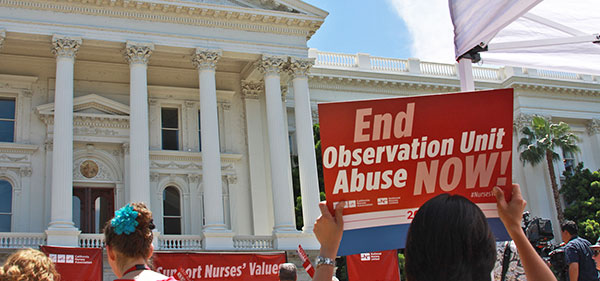Press Release
CA Bill to Set Safety Protections For Patients in Hospital ‘Observation’ Heads to Floor Vote

Important legislation to enact new protections for hospital patients warehoused in “observation status” with fewer protections accorded other patients, has taken another major step forward.
SB 1076, introduced by Sen. Ed Hernandez of West Covina and sponsored by the California Nurses Association/National Nurses United, won approval in the Assembly Appropriations Committee Wednesday. Next stop will be on the floor of the state Assembly, expected later this month. If approved by the Assembly, the bill would return to the Senate for final concurrence.
“It’s time to end this abuse,” says CNA Co-President Malinda Markowitz, RN. “Increasingly we see hospitals exploit “observation” status, which can mean holding a patient in a hospital bed or even on a gurney in a hallway for long periods of time, specifically to avoid admitting patients in need of more specialized hospital care.”
“We will urge all Assembly members to support this important reform in the approaching vote,” Markowitz said.
"SB 1076 makes certain hospitals provide quality care while ensuring staffing levels that keep patients safe, irrespective of how a patient is classified," said Sen. Hernandez."
“Use of ‘observation’ status, under which a patient can be held for hours or days with less regulatory oversight and fewer protections, puts patients at health and financial risk, nurses say. SB 1076 would extend protections for “observation” patients that are provided to other patients in the hospital setting.
“Observation” classification partly is also a tactic, nurses charge, to evade federal penalties for patients who are frequently re-admitted to hospital care after discharge; the same penalties do not apply for a patient re-admitted after discharge from an observation unit. Medicare penalties for hospital re-admissions hit a new high, affecting more than half the nation’s hospitals, according to data released just this week.
The economic consequences for patients can be extensive. Patients held under “observation” for the entire duration of their hospital stay who are then discharged to a nursing home or other long term care facility do not qualify for the same Medicare reimbursement, and can face mammoth out-of-pocket costs.
Medicare requires patients to be admitted as inpatients for three days before coverage for long-term care will kick in. However, time spent in observation does not count, as observation services are outpatient services.
Making the problem worse, patients held in “observation” in a hospital are frequently not told of their hospital status.
SB 1076:
- Clarifies that observation units must meet the same staffing standards as emergency rooms.
- Requires hospitals to provide notice to patients that observation services are “outpatient” services and third-party reimbursement may be impacted – and to mark units dedicated for “observation” status as an outpatient area when that unit is not in an ER or part of a normal inpatient unit.
- Directs hospitals to report observation services to the Office of Statewide Health Planning and Development.
- Prohibits hospitals from evading the requirements by disguising “observation” units with a different name.